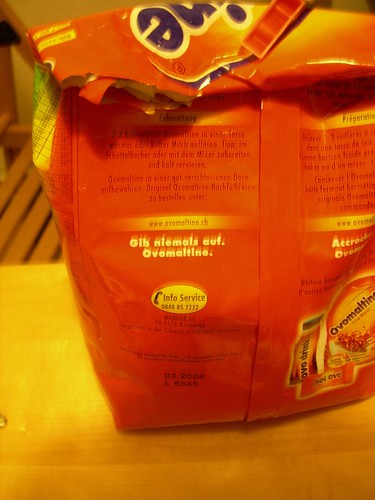Interesting read:
Author: nchenga
-
Jet lag
Last night was the second night that I couldn’t sleep cos of jet lag. Instead of trying to relax, I started googling for sites on combatting jet lag. One thing is sure, I’m doing it wrong. Apparently it takes one day of recovery for every timezone I crossed…
My current strategy is to go out and get some sun.
A couple of other links that I’d like to share:
Cooking and gardening are subversive activities. An interesting video on food.
There’s a Canon cam hack which I might try out (via TWiP).
Found a site that offers video podcasts on CSS.
-
Working for one week in SF
I’ve uploaded my wild snapshots of San Francisco covering smoothies, books, bikers, shopping, browsing magazines, coffee, cars, Ocean Beach, the hotel, buildings, streets, public transport, signs, Lufthansa and waiting.
BTW, I didn’t see a single Clinton 08 poster, I did see several Obama 08 posters and a guy selling Obama buttons. I guess, it doesn’t say much since the California primary already took place. Just something I noticed.
-
Web Ink Now: Top ten PR tips for small businesses
Top ten PR tips for small businesses
1. The old ways to get noticed were to buy expensive advertising and beg the media to write about you and your products. The best way to get noticed today is to publish great content online.
2. Don’t talk about what your products and services do. Instead talk about how you solve problems for your customers.
3. Be enthusiastic and have fun. People want to do business with people they like.
4. Dont rely on spamming the media with your press releases and PR pitches.
5. Use press releases to reach buyers directly.
6. Comment on blogs, forums and chat rooms but don’t talk about your products and services.
7. Read the popular books in your market and write a review on Amazon. Use your real name and affiliation.
8. Shoot a short video and put it up onto YouTube
9. Know what search terms people are using to find products and services like yours and create content that search engines will reward with high search engine rankings.
10. Don’t be egotistical. Nobody cares about you and your products. Your buyers care about themselves and solving their problems.
-
Radio Stations in Malawi
Bennett has listed an overview of Malawi radio stations:
- MBC Radio 1 (state broadcaster)
- MBC Radio 2 FM (state broadcaster)
- Capital FM
- Power 101 FM (Provides live internet streaming)
- Radio Maria Malawi (Provides 24 hr live internet streaming from Malawi. Currently my fave, because it brings me closer home when I am outside Malawi.)
- Star FM
- Zodiak Radio Station
- Trans-World Radio Malawi
- CFC Radio (Blantyre only)
- African Bible College (ABC) Radio (Lilongwe)
- Joy FM
- Malawi Institute of Journalism (MIJ) FM
I particularly enjoyed the talk shows on MIJ during my rare visits.
-
giorni e nuvole
I watched this movie yesterday… and it get’s the label “problem film”. It’s ok. But throughout the film I was waiting for some major action.
It’s all about unemployment, and the subsequent downsizing, and the effect it has on this Italian couple somewhere in Italia. Reflecting the stagnant economy.
As I said not bad, but I wasn’t in the mood for this topic.
-
Is the blog hype over?
Today I* was asked:
Is the blog hype over?
My answer:
Yes, the hype is over, but blogs are still around and will not disappear any time soon. In my humble opinion, blogs are becoming more and more mainstream (read “boring” for all of those geeks looking for the next big wave).
Reasons:
- I no longer need to explain the term “blog” as often
- The Web 2.0 party crowd has moved to Friendfeed and Twitter and similar services
- (i’ll try and think of more reasons tomorrow…)
- …
There’s a lot of people that read blogs, but don’t know it’s a blog from a technical point of view. For them it’s a dynamic website with frequent changes.
Some blogs are evolving into new media outlets, a lot are serving niche purpose like providing an easy and fast way to get the news out on a specific, dedicated topic.
There are people in “old school” PR and marketing that are starting to adopt blog software, as well as journalists that use blogs to enhance their online presence. A sign in itself.
There’s the SEO aspect and the regular stats mining that blog technology has made more accessible than in Web 1.0 times.
But, obviously a lot of people have noticed that creating a good blog is hard work. Blogging isn’t an easy way to get rich quick. At least not in Switzerland.
*As somebody that jumped onto the blog bandwagon early on, I guess I’ve evolved into an expert of sorts. I’m curious what blogs will eventually develop into.
I believe that individual blog sites or collaborative, mini social networks (formerly known as home pages) will remain attractive, cos I control and determine what happens on my own site (cf advertising, server downtime, centrally controlled maintenance, data ownership) instead of some corporation.
-
Chrischona = done
A small feat to celebrate in my personal blog: I jogged uphill from Riehen to St. Chrischona today at a slow and leisurely pace. The first part was tough, but about half way between Riehen and Bettingen I started to feel better. I guess the endorphin production kicked in.
Despite a setback due to flu, my regular training is paying off. Just like the message on the Ovo packaging: Never give up. Concepts which apply to other areas as well…
While running I was constantly writing and re-phrasing statements for this blog post… Something fellow blogger Persillie calls mind blogging. For me it’s one of the added benefits of running: mapping out ideas and reflecting on experiences and dreaming; mixed with lots of fresh air and movement.
I’ll try to re-run this route once in a while. And there’s also the Chrischonalauf to consider.
-
Categorize your Mess
Stumbled across this article on messiness at Green Tea Ice.
Some categories of mess:
MINIMESS — A contained, clearly delineated pocket of mess within a larger area, as on a counter, in a closet or a drawer, or on a bulletin board or a refrigerator.
CYCLICAL MESS — A mess that waxes and wanes in cycles. Some messes grow during the week (or the winter), only to be pruned back on weekends (or in the spring). Other cycles may be dictated by work, mood or pressures of parenting.
VERTICAL MESS — Anything looks neat when it’s in a pile, even unlikely objects like CD cases, magazines, mail and receipts. Gravity is a powerful glue, and the appearance of neatness can be improved by adding a bin where a pile forms.
HEAPED MESS — A large heap of items stuffed under a bed, a desk or even a couch. Oft-retrieved items do not sit around long enough to become deeply embedded, while rarely needed items become entombed at such deep levels that it can be fun to excavate them later. Broaden your notion of storage area to include spaces behind or under furniture, or between heavy appliances like washing machines and dryers.
SATELLITE MESS — There are 1.5 billion square feet worth of self-storage units available for rent in the United States. The money saved on a professional organizer could pay for a year’s worth of storage.
-
I blog to share
like this Brian Solis post. And especially this quote:
Personally I blog to share information, ideas, and thoughts and observations that may or may not help people. I’m not in the news business. Nor am I in the blogging business. But even still, it is a significant commitment, one I’m currently weighing in the greater scheme of life/work balance. I’m sure I’m not alone.
-
Twitter-like Presentations
for future reference:
I like the format of these presentations:
http://www.stoweboyd.com/message/2008/04/entrepreneurial.html
http://www.stoweboyd.com/message/2008/02/thoughts-for-to.html
-
Fresh Ginger Tea
Here’s a family secret I’m sharing free of charge:
To make ginger tea:
- Peel some fresh ginger root.
- Cut it into smaller slices or chunks and put them into a tea pot.
- Pour boiling hot water and allow to brew for a couple of minutes before serving…. é voilà !
I like drinking it hot and cold… and I leave the ginger chunks in, but you may want to adapt this to suit your own taste.
-
(I hereby confess that I miss Twitter th …
(I hereby confess that I miss Twitter the moment it goes down for maintenance, but since my new WordPress Theme provides a similar feature, i.e. I can post directly from the main homepage, here’s a Chiperoni tweet, obviously following the @nchenga convention…)
Andrew Meldrum was on CNN this morning. I found this article at the Guardian.
Everyone is waiting. SW Radio Africa has this report on a sole Zim demonstrator at the Washington embassy. Though there must be a spelling mistake in the surname… -
Malawi Blog on Learning Tumbuka
Monire monire! Muli uli?
Tobias Kumwenda has started a blog to teach Tumbuka ( via Global Voices):
The mission of this weblog is to teach those people who are not ChiTumbuka speakers located across the world, but have developed passion to learn this language.
A great idea. Keep up the good work!
See also Wikipedia:
The Tumbuka language is a Bantu language which is spoken in parts of Malawi, Zambia, and Tanzania.
The language of the Tumbuka people is called chiTumbuka – the ‘chi’ in front of Tumbuka meaning ‘the language of’, similar to ‘ki’ in kiSwahili or ‘se’ in seTswana.
The World Almanac (1998) estimates approximately 2,000,000 Tumbuka speakers exist in the aforementioned three countries.
There are substantial differences between the form of Tumbuka spoken in urban areas (which borrows some words from Chichewa/Nyanja) and the “village” or “deep” Tumbuka spoken in villages. The Rumphi variant is often regarded as the most “linguistically pure”, and is sometimes called “real Tumbuka”.
Disclaimer: Coming from Blantyre, my Tumbuka knowledge is non-existent, except for some vocab overlaps with Chichewa, even though I went to college with lots of northern Malawians.
-
Web to SMS
for future reference:
I use Twitter’s direct messages to send out an occasional text message. I’m trying to set up a Twitter account for my family in Blantyre. The idea would be to DM them via Twitter. But somehow, the cell phone authentication is *not* working. (Any ideas?)
As an alternative, I found this page listing services that offer free text messages from a web interface, mostly for Switzerland:
http://www.tiptom.ch/gratis/sms.html
A third alternative is to upload a couple of Euro/$/CHF to my Skype account and text directly from my Skype client. I’ve used this in the past for text messages and voice. Works great.
-
Stumbled across this, while searching for “tintin comic” for a work-related task:
A collection of cars that appeared in the Tintin comics. -
Baumgrenze
Started talking about the tree line in the Alps and looked up this page and this page.
Factors:
Depends on aspect of slope, rain, and distance to the poles (or how close it is to the equator), and in some cases vegetation…Swiss Alps: 2100 m
Mount Kilmanjaro, Tanzania: 3000 m
Andes, South America: 3900 to 5200 m










